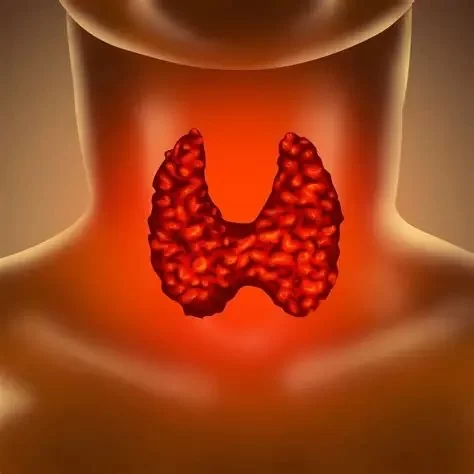- 1 - Understanding Thyroid Disorders
- 2 - The Link Between Thyroid and Heart Health
- 3 - How Thyroid Disease Affects the Heart
- 4 - Symptoms of Thyroid and Heart Problems
- 5 - Managing Thyroid and Heart Health
1 - Understanding Thyroid Disorders
The thyroid is a small butterfly-shaped gland located in the neck that plays a crucial role in regulating your body’s metabolism. It produces hormones that influence nearly every cell in your body, affecting everything from your energy levels to your heart rate. When the thyroid becomes overactive (hyperthyroidism) or underactive (hypothyroidism), it can disrupt your metabolism and have far-reaching effects on your health, including your heart.

1.1 What Causes Thyroid Disorders?
Thyroid disorders can arise from various causes, including autoimmune diseases like Graves' disease (hyperthyroidism) or Hashimoto's thyroiditis (hypothyroidism), iodine deficiency, and even certain medications. Genetics and lifestyle factors can also play a significant role in the development of these conditions.
Atlanta Heart Specialists
atlanta heart specialists
4375 Johns Creek Pkwy #350, Suwanee, GA 30024, USA

1.2 Types of Thyroid Disorders
The two most common types of thyroid disorders are hyperthyroidism and hypothyroidism. Hyperthyroidism occurs when the thyroid gland produces too much thyroid hormone, leading to symptoms such as rapid heartbeat, weight loss, and anxiety. In contrast, hypothyroidism occurs when the thyroid doesn’t produce enough hormones, resulting in fatigue, weight gain, and depression. Both conditions can significantly impact heart health.
2 - The Link Between Thyroid and Heart Health
While thyroid disorders are primarily metabolic in nature, they also have a surprising connection to heart health. Thyroid hormones play a critical role in regulating your heart rate, blood pressure, and the overall function of your cardiovascular system. When these hormones are out of balance, it can lead to cardiovascular problems.
2.1 How Thyroid Hormones Affect the Heart
Thyroid hormones influence the heart's function by regulating the rate at which the heart beats, the strength of the heartbeat, and how the blood vessels respond to signals from the body. For example, hyperthyroidism can increase heart rate, potentially leading to arrhythmias, while hypothyroidism can slow the heart rate, resulting in bradycardia (abnormally slow heart rate).
2.2 Thyroid Dysfunction and High Cholesterol
Both hyperthyroidism and hypothyroidism can lead to abnormal cholesterol levels. Hypothyroidism, for example, can increase low-density lipoprotein (LDL) cholesterol, commonly referred to as “bad” cholesterol. High levels of LDL can lead to plaque buildup in the arteries, raising the risk of cardiovascular diseases such as heart attacks and strokes.
3 - How Thyroid Disease Affects the Heart
Thyroid disease can have a significant impact on your heart, whether you’re dealing with an overactive or underactive thyroid. Here’s how each type of thyroid disorder can affect your cardiovascular system:
3.1 Hyperthyroidism and the Heart
When the thyroid produces too much hormone, it speeds up the heart rate, increases the demand for oxygen, and can cause the heart to work harder. This can lead to symptoms such as palpitations, chest pain, and even heart failure in extreme cases. Prolonged hyperthyroidism can also contribute to atrial fibrillation, a type of irregular heartbeat that increases the risk of stroke.
3.2 Hypothyroidism and the Heart
Hypothyroidism, on the other hand, can slow the heart rate and reduce the heart’s ability to pump blood efficiently. This can cause a condition known as diastolic heart failure, where the heart struggles to fill with blood properly. Additionally, hypothyroidism can lead to high blood pressure, particularly in the arteries, contributing to cardiovascular stress.
4 - Symptoms of Thyroid and Heart Problems
Recognizing the symptoms of both thyroid and heart problems can be difficult since many symptoms overlap. Here are some signs to watch out for:
4.1 Symptoms of Hyperthyroidism
If you have hyperthyroidism, you may experience a racing heart, chest pain, shortness of breath, or palpitations. Additionally, weight loss, irritability, and fatigue are common. It’s crucial to see a doctor if you notice these symptoms, especially if you’re also experiencing heart-related issues.
4.2 Symptoms of Hypothyroidism
In cases of hypothyroidism, common symptoms include fatigue, weight gain, depression, and a slow heart rate. You might also experience high blood pressure and elevated cholesterol levels. If left untreated, hypothyroidism can lead to severe cardiovascular complications, so it’s important to monitor these symptoms.
5 - Managing Thyroid and Heart Health
Managing both thyroid and heart health requires a comprehensive approach, including proper medical treatment, lifestyle changes, and regular monitoring. Here’s what you can do to maintain both:
5.1 Treatment Options for Thyroid Disorders
Treatment for thyroid disorders typically involves medication to balance hormone levels. For hyperthyroidism, anti-thyroid drugs or radioactive iodine therapy may be prescribed, while hypothyroidism is usually treated with synthetic thyroid hormone replacement. In some cases, surgery may be necessary to remove part or all of the thyroid gland.
5.2 Lifestyle Changes for Heart and Thyroid Health
Adopting a heart-healthy lifestyle is essential when managing thyroid-related issues. This includes eating a balanced diet, exercising regularly, and avoiding smoking and excessive alcohol consumption. Monitoring your cholesterol levels and blood pressure is also crucial to reducing the risk of heart disease.
5.3 Regular Monitoring and Consultation with a Healthcare Provider
If you have a thyroid disorder, it’s important to regularly monitor your heart health. Keep track of your blood pressure, cholesterol levels, and heart rate, and consult your healthcare provider for routine check-ups. Early detection and management of both thyroid and heart issues can prevent severe complications.
In conclusion, thyroid disorders are more than just a metabolic concern; they are closely linked to heart health. By understanding the relationship between thyroid function and cardiovascular health, you can take proactive steps to manage both conditions effectively and live a healthier life.






















Deborah Heart and Lung Center
deborah heart and lung center
200 Trenton Rd, Browns Mills, NJ 08015, USA